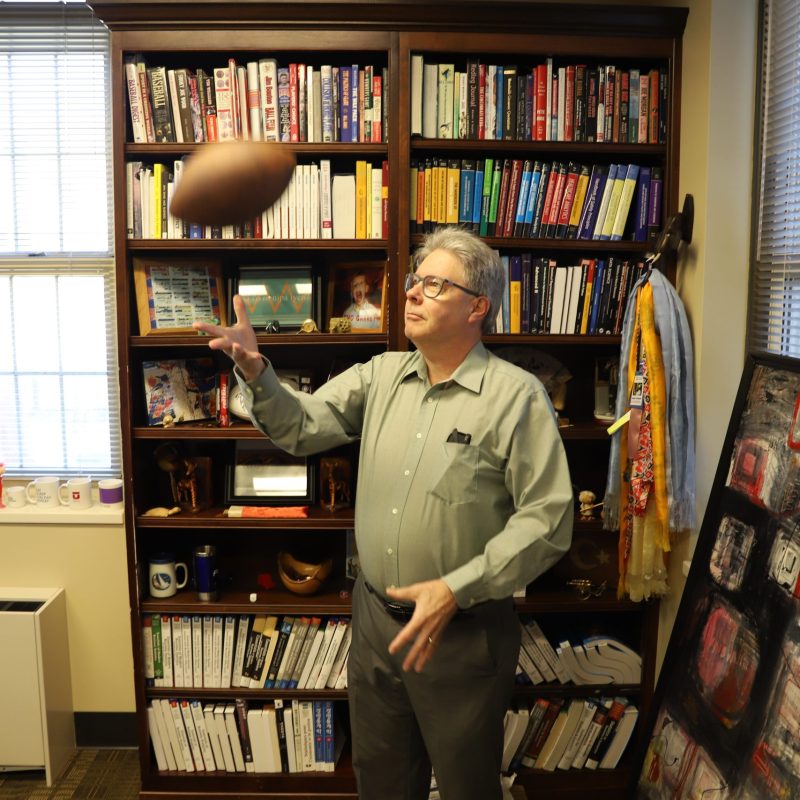Football fans are a passionate group. They all love their team, win or lose. They feel deeply connected to their team. They also believe, with all their heart, the refs are biased against them.
University of Alabama football fans can relate. The game-changing pass interference call on Bama late in the game against Tennessee in 2022 still stings. The illegal touching call on the touchdown catch by Ryan Williams against Oklahoma in 2024 was agonizing.
When a penalty flag hits the turf late in an NFL game, millions of fans share the same belief that “the refs are out to get us.” For James J. Cochran, a professor of statistics and the Mike & Kathy Mouron Research Chair at The University of Alabama’s Culverhouse College of Business, that narrative is based more on emotion than evidence.
Cochran was recently part of an ESPN investigation into the conspiracy theory that certain NFL teams benefit from biased officiating. The project analyzed years of penalty data, searching for patterns that might confirm fans’ suspicions. The result? No systematic evidence of favoritism.
“Everybody thinks their case is unique,” Cochran said. “They’re wrong. Over time, these things average out. Sure, every once in a while, one team seems to get a series of calls at the most opportune times, but that’s random. If it didn’t happen, that would actually be suspicious.”
For Cochran, the passion behind the debate isn’t surprising. As a self-professed Bengals fan, he has his own memories of questionable calls in tight games against the Chiefs, who have played in five of the last six Super Bowls, winning three. But he doesn’t mistake them for evidence of systemic bias. “It’s just how it goes,” he said. “If you’re looking for it, you’ll see it.”
The ESPN study, however, did reveal some surprising wrinkles. When researchers isolated “impact penalties” like late-game pass interference or holding calls that can swing win probability, the results were counterintuitive. Teams that committed these penalties in the fourth quarter or overtime actually won more often than when they didn’t. “That was pretty profound,” Cochran said. “Maybe aggressive teams are more likely to win anyway. We’re still thinking about what the explanation could be.”
The analysis also highlighted coaching differences. Winning coaches, such as Kansas City’s Andy Reid, tend to be more successful when challenging calls. Surprisingly, Bill Belichick, who won six Super Bowls with the New England Patriots, challenged less often in his later years than many assumed.
Cochran’s collaboration with ESPN is just the latest chapter in a career that has frequently bridged statistics and journalism. He has worked with Reuters on projects ranging from Supreme Court bias to the relationship between loss of bat habitat due to deforestation and zoonotic transfer of viruses, and earned a Scripps Howard Award and assisted with a Pulitzer Prize winner and two runners-up along the way. Earlier, he contributed to HBO’s Real Sports with Bryant Gumbel on stories about domestic violence among athletes and the New York Times on stories about chronic traumatic encephalopathy (CTE) in football players.
Statistics, Cochran believes, are a way to bring clarity to emotional debates, whether about public health, human rights, or the integrity of sports. His current work with Reuters involves using satellite imagery to track makeshift grave sites in famine-stricken areas, data that has already influenced international aid efforts.
Still, sports remain a sweet spot. A baseball fan at heart, Cochran jokes that his friends once tried to get him a jersey with the number “.05,” a statistician’s inside nod to significance testing, though it ended up simply as No. 5. “Johnny Bench wore five,” he said. “That’s pretty good company.”

